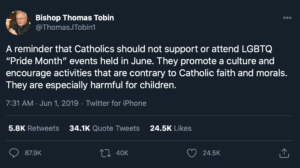Tag: Savannah Plaisted ’21
Seniors’ Final Words: Student Leaders Talk Social Justice at PC
by kwheele4 on May 7, 2021
Campus
Seniors’ Final Words: Student Leaders Talk Social Justice at PC
by Nicole Patano ‘22, Co-Asst. Head Copy Editor, and Savannah Plaisted ‘21, Opinion Co-Editor
The class of 2021 has been through a great deal—the second semester of their junior year was interrupted by the pandemic and a transition to fully remote learning for the first time in their lives, and through their senior year they have had to cope with going between in-person and remote classes.
The class is now graduating into a not yet fully recovered economy and one of the most difficult years to get accepted into postgraduate schools due to an increased interest in students returning for postgraduate degrees.
The seniors also had to endure all of this against the backdrop of the largest civil rights movement in recent decades. In response to this, schools, businesses, and organizations across the country have been forced to reconcile with diversity, equity, and inclusion issues; of which Providence College has been no exception.
Even through all of this, the senior class worked incredibly hard. They did not allow the immense obstacles they faced to dissuade them from working towards social change on PC’s campus and beyond. In many cases, student leaders took charge in pushing for social change on campus.
The Cowl reached out to 50 seniors who have been active and involved in student organizations leading social justice initiatives on campus with four prompts that they could respond to. Students were not required to respond to all prompts; however, some chose to. Since most of the responses The Cowl received pertained to students’ opinions on diversity, equity, and inclusion on PC’s campus, the article has centered this theme. This article is meant to provide a platform for these students to reflect on their time at PC and voice their opinions on the status of diversity, equity, and inclusion on campus, one last time as undergraduates at the College. While some students allowed The Cowl to share their names, we ask that the privacy of those students who chose to use their initials or to remain anonymous be respected. The Cowl selected the responses below for publication because they best capture the sentiments and hopes of many students who responded to The Cowl’s request for comment and because they pertain to the article’s intended goal of highlighting the experience of doing social activism at the College. The Cowl thanks all of the seniors who provided responses for this article.
“What would you like to say to PC administration before you graduate?”
CR ’21: “In a short few weeks, I will be graduating from this institution, burnt-out, exhausted, and frustrated with the lack of initiative displayed to address various institutional issues and the constant gaslighting/defusing of student/faculty activism. Unfortunately, PC never felt like home to me. I constantly think about what my undergraduate experience would’ve been like if I transferred to an institution that took student/faculty demands seriously. Thus, I urge you all to re-evaluate the ways in which you silence minoritized students & faculty members by your lack of action.”
Anonymous ’21: “Providence College, you have made a tough, loud woman out of me. It was, however, at the cost of discrimination and exclusion.”
Jolssen Rodriguez ’21: “I can vividly see the more power you have, the less control you have. Remember why you chose your position and remember the people you are supposed to support (us, the students) versus the people you like to support.”
Estarlyn Hiraldo ’21: “Stop settling for less. Put the students first.”
Emili Castro ’21: “As a BIPOC student, I rarely felt a part of the Friar Family. I know I am not the only one—Providence College, do better.”
“How would you describe your experience at Providence College?”
Estarlyn Hiraldo ’21: “My experience at Providence College was one to be remembered, but never had again. I did not feel supported as underrepresented students should be. But I am grateful for the challenges and hardships that made me a stronger person.”
Junielly Vargas ’21: “It was the best of times and the worst of times but I wouldn’t have changed it for anything. Thank you for pushing me to the strongest version of myself.”
Talysha Rivera ’21: “I would describe my experience at Providence College as a microcosm of our American capitalistic society. The racism, sexism, classism, and the anti-LGBTQ+ sentiment on top of the pressure to succeed academically and prepare for your career is extremely exhausting. Providence College taught me the harsh reality of the society we live in and has encouraged me to create my own reality and find security in myself.”
Jolssen Rodriguez ’21: “I was forced to grow up and not into a “presentable adult” but to grow up and realize that the microcosm of PC was really the front-line battle of survival and resilience. I am stronger because I had to be, not because I wanted to be.”
Anonymous ’21: “Honestly, frustration. I understand that change moves slow, but that slow movement towards progress sometimes seems like an intentional effort to disempower and frustrate students so that they give up in calling for change.”
Shannon Sullivan ’21: “My time at PC has changed my view of the world. I have grown a lot during my four years, and I attribute much of that to my role as a student leader fighting for change on campus.”
“What is your hope for the future of Providence College?”
Anonymous ’21: “My hope for the future of Providence College is to hold students accountable for their wrongdoings, actually listen to staff and faculty, and follow up with action. I hope marginalized, BIPOC, and LGBTQ students are valued and respected more by their peers, staff, faculty, and administration.”
Julia Murphy ’21: “My hope for the future of Providence College is that PC keeps striving to be a place where everyone feels at home and can thrive—regardless of their race, socioeconomic status, ethnicity, gender identity, sexual orientation, religious beliefs, etc.—not only academically, but socially and emotionally…Throughout my time at PC, I have felt loved, welcomed, and supported every step of the way. It is my hope that every single student is provided with the opportunities and relationships to experience those same things.”
Jolssen Rodriguez ’21: “I hope PC learns what it means to hold the name “Providence.” I want to return to PC and see the city of Providence be accurately, equitably, and honorably represented and, if not, then have a donor pay to change your name.”
Estarlyn Hiraldo ’21: “I hope that going forward, Providence College becomes a more inclusive and less narrow-minded institution, more accepting of diverse identities and perspectives even if they do not align with traditional Catholic values.”
Carly Johnson ’21: “My hope for the future of PC is to create an atmosphere that is more diverse and accepting of every student. I feel that progress needs to be made to ensure that our BIPOC and LGBTQIA+ community members can feel wholly safe and included on campus. I also hope that students can feel accepted regardless of their religious beliefs.”
Kevin Schwalm ’21: “My hope is that the College will continue to re-evaluate how it handles different issues for students on campus, so it can truly become an inclusive environment for every student.”
Anna Russo ’21: “I hope for a more collective Friar Family that is socially responsible and filled with more active listeners.”
Shannon Sullivan ’21: “I hope to come back and see long-demanded changes implemented. In essence, I hope PC becomes a better and more welcoming environment in the years to come.”
“What or who has been your safe haven during your time at PC?”
Anonymous ’21: “Other student activists such as those in BMSA, Shepard, PC DSA, PC CAR. I probably would have transferred if I didn’t know that other people were helping fight for change.”
Estarlyn Hiraldo ’21: “If it wasn’t for my family, friends, club safe spaces like WDOM and OLAS, and mentors like Liz Lombard, Ralph Tavares, Taiwo Adefiyifu, the Personal Counseling Center, my professors (to mention a few), I would not have persevered during my time at PC. They’ve held me up at my lowest points.”
Jolssen Rodriguez ’21: “Thank you to the students, faculty, and staff who saw me and smiled. Thank you to the student leaders and activists that allowed me to create my space on campus and understand who I am.”
Strong, Resilient, and Beautiful: Women Empowered Creates Own Community
by The Cowl Editor on April 15, 2021
Campus
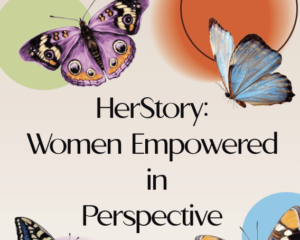
by Savannah Plaisted ’21 and Nicole Patano ’22
Opinion Editor and Asst. Copy Editor
Before Easter break, The Cowl had the opportunity to interview members of Women Empowered’s executive board and discuss the importance of the club’s presence on Providence College’s campus.
Women Empowered was founded in 2012 to give a space to women of color on campus in which they can unapologetically be themselves. According to current president, Talysha Rivera ’21, the main goals of Women Empowered are “to create a support group for women of color on campus and to be an advocacy group for women on campus.”
The group serves as a safe space for women of color at the College and allows for open discussion in order for voices that are frequently marginalized to be heard. One of the biggest successes of Women Empowered is the community and sisterhood that the members create. At the start of each Women Empowered meeting, members have time to talk about how they are feeling and how their week was. “I don’t think anyone comes in with negative energy,” said Ekua Boakye-Mensah ’22, vice president of Women Empowered. “You leave your problems at the door.”
While Women Empowered is typically a member club of the Board of Multicultural Student Affairs, at the beginning of last semester, the executive board decided to take a break from BMSA to devote their attention to Women Empowered. This decision mainly came in response to the events of last summer, including the murders of George Floyd and Breonna Taylor. Rivera explained, “At that time, we were all really drained with continuously speaking, and it felt like a time to be there for each other rather than speak out.” Rivera and Boakye-Mensah emphasized that it is not the responsibility of Women Empowered to educate people now, when they are ready to listen, because the group has been doing it for years with little support or thanks.
Women Empowered’s decision to leave BMSA allowed the club to better support and empower its members, which has always been its main goal. Nicola Calabrese ’22, one of the club’s public relations coordinators, stated that Women Empowered has “definitely always been for ourselves and our own journey.” Expanding on this, Boakye-Mensah commented, “Within our own club, I can definitely say we make a difference…but when I was in BMSA and these other spaces where people ask us to come and speak, it just feels like we’re just there as a demographic.”
There is a large mental health component to Women Empowered that makes it a necessary space on campus for women of color. “Because PC is a PWI [predominantly white institution],” Calabrese shared, “you’re surrounded by people who may not look like you or experience the same things that you do, so it’s nice to be centered and be surrounded by people who are feeling similar things that you are.” Rivera added, “It’s just a good feeling to feel that you can have a space to speak your truth and not feel judged.”
In addition to their weekly meetings, the events which Women Empowered organizes provide a space for women of color to express themselves unapologetically. In previous years, Women Empowered hosted a retreat for women of color entering PC in order to provide them with a welcoming environment early on in their college experience. Despite the COVID-19 pandemic, Women Empowered has continued to be a source of sisterhood for many of the women of color on campus.
Two major events that Women Empowered holds annually are Naturalista and Herstory. According to Rivera, Naturalista is “a way of supporting Black-owned businesses while also embracing natural hair products and the natural beauty of women of color that doesn’t fit into the standard of what being beautiful is.” The event includes a barber, henna, eyebrow threading, and holistic care products for women of color. PC students can even sell their own products, such as swimwear and artwork.
This year, Herstory was held from March 8-12 in the Slavin overlook lounge. The event was titled “Herstory: Women Empowered in Perspective” and included personalized images of women of color on campus with biographies that included how the women understand the world around them. Explaining the significance of Herstory, Calabrese said, “[It] showcases the people who might feel like they’re overshadowed on campus, so it gives them the spotlight.”
As a club specifically for women of color at a predominantly white institution, Women Empowered has been intentionally and inadvertently belittled, invalidated, and ignored by members of the PC community. After years of fighting for an office space, Women Empowered was finally granted one in Slavin, but Calabrese describes the room as a “closet-looking thing with no windows.” Women Empowered’s events are also not widely publicized or attended by the College, unlike many other clubs on campus.
Despite these challenges, Women Empowered continues to be a force to be reckoned with. “We’re a group of bad bitches,” said Rivera. “Even though our voices aren’t heard…we still find the power and resilience to stand up for ourselves.”
Rivera, Boakye-Mensah, and Calabrese are not disheartened by the obstacles they encounter. Boakye-Mensah knows that “for us to have our space and for us to be on the front lines, is just going to encourage other generations.”
Women Empowered meets weekly on Wednesdays at 8 p.m. over Zoom. Meeting information can be found on the club’s Instagram page, @womenempowered_pc.
Pope Francis, Bishop Tobin, and the LGBT+ Community: A Call to Action
by The Cowl Editor on October 29, 2020
Campus
Pope Francis, Bishop Tobin, and the LGBT+ Community: A Call to Action
By Savannah Plaisted ’21
Opinion Co-Editor
Pope Francis made history this month with his statement regarding the LGBT+ community in the recently released documentary Francesco. In the documentary, Pope Francis says, “What we have to create is a civil union law. That way they [gay couples] are legally covered.” This statement went viral and grabbed mass public attention given the magnitude of a pope expressing public support for civil union protections for the first time.
Yet, here in Providence, Bishop Thomas Tobin made a completely contradictory statement, saying, “The legitimization of their civil unions, which seek to simulate holy matrimony, is not admissible.” This is a clear indication that Bishop Tobin not only opposes the progressive views held by many in the Church community and leadership, but, in this case, is in direct opposition to the highest authority in the institution.
The conversation regarding the relationship between the Church and LGBT+ individuals has also been present on campus. In the recent town hall held by Father Sicard on Monday, Oct. 5, one of the questions anonymously posed was, “How will PC protect LGBTQIA students especially considering the Church’s views on marriage?”
Both Father Kenneth Sicard, O.P., and Father James Cuddy, O.P., stressed the necessity of respecting every member of our community. Jacqueline Peterson, advisor to the president for diversity, equity, and inclusion, mentioned that the Office of IDEI was working with SHEPHARD to determine strategies to make LGBT+ students feel safe. However, these responses failed to provide any concrete plan or decisive action that the College will take to protect its LGBT+ students.
On homosexuality, the Catechism of the Catholic Church says, “This inclination, which is objectively disordered, constitutes for most of them a trial. They must be accepted with respect, compassion, and sensitivity. Every sign of unjust discrimination in their regard should be avoided.”
Although the Catechism then declares that homosexual marriage is forbidden within the Catholic Church, it does provide a minimal acknowledgement of homosexual peoples within the Church and encourages them to take on a life of chastity. While the pope’s statement of support is not official Church doctrine, this is the first time a pope has been so explicit in presenting a view at odds with the Catholic Church on the rights of LGBT+ people.
The Roman Catholic Diocese of Providence has a history of maintaining an unforgiving stance on gay marriage by its religious authorities, namely Bishop Tobin. During Pride Month in June 2019, Providence received a message of hate that attracted not only national, but also global attention.
This message came from Bishop Tobin in the form of a tweet that stated: “A reminder that Catholics should not support or attend LGBT+ ‘Pride Month’ events held in June. They promote a culture and encourage activities that are contrary to Catholic faith and morals. They are especially harmful for children.”
Although the beginning statement is arguably in line with Catholic doctrine, how Bishop Tobin continued to fill in the 280 characters allowed by Twitter opens the door for misinterpretation and offensive undertones.
Providence College professors from a range of religious and political associations were interviewed in October of 2019 about Bishop Tobin’s statement. They were in complete agreement that the tweet was a mistake. In the words of Father David Stokes, “I think it’s unfortunate when clergy resort to tweets to score theological points. I thought it was lacking in pastoral sensitivity and just plain unnecessary.” Dr. James Keating of the theology department reiterated this idea, remarking, “I thought it was stupid and he shouldn’t have done it. Which I think he thought as well—I think the people around him thought it was ill-advised.”
Both professors shared the same foundational idea: the statement should not have been tweeted because the word limit imposed by Twitter leaves massive space for misinterpretation of ideas. Due to the vague nature of this tweet, professors and students alike had a broad range of reactions and interpretations.
In addition to Fr. Stokes and Dr. Keating, Dr. Despina Prassas of the theology department shared that her initial reaction was, “That’s the question—whether he, as shepherd of his flock, may not understand the commitment of all the members of the Catholic Church here in Rhode Island and is not able to support them.”
As for student reactions, Jolssen Rodriguez ’21 said, “Recognizing a month for our community’s love and pride goes against anyone’s Catholic morals who wears the same glasses as Bishop Tobin, but it does not go against Catholicism itself.”
Regardless of what Bishop Tobin meant when he tweeted this message, he failed in his delivery. Rather than make a legitimate theological claim on the Church’s teaching on marriage, Bishop Tobin’s tweet was deeply hurtful to many within and outside of the Providence community.
Now, how should PC respond to the kind of rhetoric exhibited in Bishop Tobin’s tweet? The College claims to be an accepting campus and in its Notice of Non-Discrimination, states: The College “does not discriminate on the basis of race, color, national and ethnic origin, sex, gender, sexual orientation, gender identity, religion, disability, age, veteran status, or genetic information, in the administration of its education policies, admission policies, scholarship and loan programs, athletic and other College-administered programs, and employment policies.”
The beginning of the College’s Non-Discrimination statement explicitly affirms that PC is accepting of those of various sexual orientations, meaning of members of the LGBT+ community.
However, that same clause goes on to state that “the College reserves the right to take actions designed to ensure and promote its Catholic and Dominican mission.”
This raises the question: to whom should Catholics, specifically Catholics at the College, look for an answer on where the Church stands on homosexuality? It is quite clear from Bishop Tobin’s newest statement, in addition to his tweet, that he has low regard for the LGBT+ community—especially if he deems its activities “harmful to children.”
Fr. Stokes, in response to Bishop Tobin’s disconnect with the pope, stated, “I see the Church as having fragmented to such a degree that it will take decades to recover—and I’m not even sure that it would mean to recover. I’m afraid a faithful laity has been afflicted with a spiritual Stockholm syndrome by an inbred and rancid clericalism.” Given the views that Bishop Tobin holds, which he expressed in his tweet, it is evident that he is contributing to that division within the Catholic Church, especially with his recent statement in response to Pope Francis.
Bishop Tobin’s involvement at PC is written into the Bylaws of Providence College, making it difficult for LGBT+ students to feel accepted by the College, which already struggles with inclusivity as it is. In the bylaws, it is established that one of the powers of the Corporation of the College is:
“To elect members of the Corporation and of the Board of Trustees and when, in its sole discretion required for the good of the College, to remove the President of the College, or any member of the Corporation or of the Board of Trustees, excepting only the Roman Catholic Bishop of the Diocese of Providence (Bishop) and the Provincial of the Province of St. Joseph, Order of Preachers (Provincial).”
This statement establishes that the Bishop of Providence can never be removed from the Board of Trustees or the Corporation. Thus, Dr. Keating is justified in suggesting that “there’s no way on God’s green earth that PC is going to say to the bishop that he isn’t welcomed here because we’re now an accepting campus—that’s not how things work in the Church.”
However, the bylaws also state that a power of the Corporation is: “To adopt and amend these bylaws, at any time and from time to time, in any and every respect not inconsistent with the Charter and all amendments thereto.” Thus, the bylaws of the College do allow for amendments to the bylaws. In fact, the bylaws have been amended 18 times since they first became effective in 1992.
An amendment that would change the College’s relationship with the bishop may not be possible, and if it is, the process would likely be difficult and lengthy considering the College’s relationship with the Catholic Church and the diocese of Providence.
Nonetheless, the College should at least consider this avenue given the amount of hurt that Bishop Tobin’s statements have caused to members of the community, and given the fact that the Corporation is allowed to remove the President of the College and other members of the Corporation and Board of Trustees when necessary.
An amendment of PC’s bylaws to remove the clause “excepting only the Roman Catholic Bishop of the Diocese of Providence,” in no way means that the bishop would no longer hold a position in the Corporation or on the Board of Trustees, but it would give the College the power to remove the Bishop of Providence from its Board of Trustees if necessary, a power it has with the president of the College and any other Board member.
With this power, the College could thus remove a bishop, like Bishop Tobin, who, in some of his public comments, fails to consistently show love and respect to LGBT+ people. This is an important part of protecting the LBGT+ community on campus and acknowledging their experiences.
As many in our community have suggested and will continue suggest, the College should take the following actions in order to protect its LGBT+ students:
- Hire a Chief Diversity Officer that is well versed in LGBT+-related issues.
- Allow student groups to use the word “pride” in events in support of the LGBT+ community.
- Amend the Bylaws of Providence College to remove the clause “excepting only the Roman Catholic Bishop of the Diocese of Providence.”
- Release an official statement from the College or President’s Office in support of its LBGT+ students in light of Pope Francis’s comments, and address Bishop Tobin’s response in said statement given the fact that it hurt members of the PC community.
To the administration of PC, I ask, what is next? Where are we heading from here? You must consider the message you are sending to your LGBT+ students. We are here, and we are paying close attention.
Safety Advisory and Humanities Forum Incidents Highlight Issue of Race on Campus
by Kyle Burgess on September 17, 2020
Campus
by Hannah Langley ’21
News Co-Editor
For several years now, Providence College has put diversity at the forefront of its planning, making it one of the milestones of its PC200 plan. While PC has improved in diversity in some ways, incidents from the past week have proven that the College still has work to do in creating the beloved and accepting community it promotes.
On Thursday, Sept. 10, an email with a safety advisory was sent to the PC community addressed from Koren Kanadanian, Chief of Public Safety. This safety advisory addressed potential “suspicious activity” reported earlier that day by a student walking on Admiral Street. As the safety advisory states, the student claimed they “had been approached by a light skinned male, with a heavy build, who was operating a grey minivan.” It was then stated the “operator pulled over to the curb but stayed in his vehicle” and then “motioned the victim towards the car while attempting to communicate in Spanish.”
This email was sent at 10:17 a.m. Nearly 30 minutes later, a series of emails were sent out by Kanadanian, stating that he would like to “recall the message.” Later that afternoon, Kanadanian addressed the PC community, stating the advisory was “premature, incomplete, and, most importantly, as worded, racially and linguistically insensitive.”
Father Kenneth Sicard, O.P., sent an email the following day stating Kanadanian will be taking a 60-day leave of absence and will be taking diversity, equity, and inclusion (DEI) training during this time. The email also addressed steps PC administration will be taking going forward to help eliminate bias and profiling on campus.
Many students, clubs, and organizations spoke out about the wording Kanadanian used in his safety advisory. The Organization of Latin-American Students (OLAS) released a statement on their Instagram account, stating the safety advisory was “harmful for the Latinx community and local Providence community,” as it “perpetuates the systematic racism and discrimination actively present at Providence College.” OLAS followed this statement by inviting the PC community to attend their Zoom meeting to discuss the matter further.
This was not, however, the only incident that became a large point of discussion on campus. Information about Dr. Spencer Klavan, a guest speaker invited to discuss Homer’s Iliad as part of the Humanities Forum series, became quite the controversy. It was made apparent that Klavan wrote controversial statements on his social media in regards to topics such as race, gender, and sexual orientation. These remarks, many students believed, did not reflect the PC community or its values, leading many students and faculty to protest Klavan’s invitation to speak at the Forum.
In response, Dr. Sean Reid, provost and senior vice president for academic affairs, sent an email stating, “The speaker was invited as scholar of the Classics, not because the College or the Humanities Forum Committee endorse the comments he makes on social media.”
Dr. Raymond Hain, the Associate Director of the Humanities Forum Committee, defended Klavan’s presence at the Forum, saying, “it is nevertheless worth keeping in mind that it has always been our practice to invite a broad range of viewpoints to the Forum, including conservative political voices. I believe it is unavoidable that a speaker series that strives to maintain a robust and diverse range of perspectives will at times trouble members of our community, and my hope is always that the proper response is robust intellectual engagement and discussion.”
This incident also led to many students, faculty, and staff within the PC community to speak out against Klavan’s invitation and the defense behind continuing to allow him to speak despite the protest. To learn more about the student backlash surrounding this article, including responses by the PC community, read “Humanities Forum Offensive to Many” by Savannah Plaisted ’21 and The Cowl’s Letters to the Editor in this issue.
These incidents come to PC during an already tumultuous and uncertain time. In his address to the PC community following the safety advisory, though, Fr. Sicard recognized the need for change, saying, “what happened [Sept. 10] provided yet more evidence of how far we are from achieving our goal of being a beloved community.” As a PC community, let us strive to do as Fr. Sicard implores and create “concrete steps to address the systematic racism that exists on our campus.”
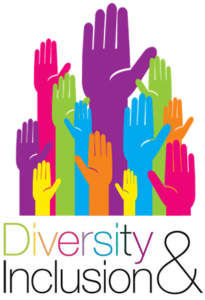
Humanities Forum Offensive to Many: Speaker’s Hateful Social Media Draws Campus-Wide Attention
by The Cowl Editor on September 17, 2020
Campus
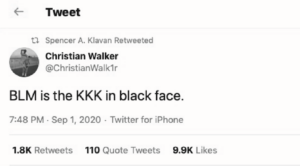
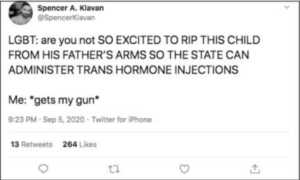
Humanities Forum Offensive to Many
Speaker’s Hateful Social Media Draws Campus-Wide Attention
by Savannah Plaisted ’21
Opinion Co-Editor
Over the past several months, Providence College administrators and representatives released multiple statements that claimed they were committed to combating racism and improving diversity on our campus. However, inviting academics like Spencer Klavan to speak on this campus contradicts the commitments that the College made, and serves as evidence that PC is not seriously committed to acting on these promises.
Klavan was invited to speak on the Iliad at last Friday’s Humanities Forum. While the topic of Klavan’s presentation on campus was not controversial, his personal Twitter account was discovered to be riddled with inflammatory rhetoric on topics of race, gender, and sexual orientation. He also expressed his position on wearing masks, through publicly encouraging people to not wear them.
One of Klavan’s retweets was “BLM is the KKK in black face,” and one of his personal tweets was “Anyway, there are two genders, you’re probably not racist, and America is excellent.”
Given that we are currently experiencing one of the biggest national civil rights movements in history, and the fact that the College had been called out for the use of racist language in a safety advisory released by the Office of Public Safety the day before, it could not have been a worse time to host someone with views like Klavan’s on campus.
As word spread on Friday about Klavan’s Twitter, a number of students began emailing the Humanities Forum Committee members, calling for the cancellation of the Humanities Forum scheduled for later that afternoon. Additionally, a number of professors and departments expressed their discomfort in allowing the Forum to continue as planned.
Dr. Abigail Brooks, the director of the women’s and gender studies program, said in a statement alongside Dr. Zophia Edwards, director of the black studies department, “The WGS and BLS Programs strongly condemn this decision.” Dr. Erin Schmidt of the theatre, dance, and film department, and a Humanities Forum Committee member, wrote, “I think it is important that I state, for the record, that I, too, would like to see the Forum cancelled with Mr. Klavan.”
Despite this, the Forum went on as planned on Friday at 3 p.m. Student activism, condemnation from three members of the Humanities Forum Committee (including Dr. Schmidt), and calls to cancel the event from multiple professors were not enough.
Dr. Hain indicated that the Humanities Forum Committee does not vote on speakers; rather, he himself has the final say on the selection process. “The Humanities Forum Committee works collaboratively,” he said, “but [it] does not vote on each semester’s schedule or on particular events.”
What, then, is the purpose of having a committee full of professors? If these events are put on for the advancement of student knowledge, should students not have a say in picking speakers? Dr. Hain stated, “Now that the Forum is part of the Humanities Program, I hope eventually to include one or more students in the Program in the work of the Forum committee.” This, however, is part of a long-term plan, so there is no indication of when students might be included.
Sean Reid, the Provost, issued a statement just minutes before the end of the Forum, explaining that the problematic nature of Klavan’s Twitter had been brought to the College’s attention on Wednesday, Sept. 9. Yet, despite the fact that this discovery was made far enough in advance to have cancelled the Forum, the College made the determination that Klavan’s rhetoric was not hateful enough to cancel the event, and concluded that a cancellation would “set a bad precedent for the expression of diverse viewpoints and for the possibility of open debate.”
Is it not more important to vet such individuals before inviting them to campus to ensure that their public statements are in line with the values of the College and not offensive to members of the Providence College community? Dr. Hain wrote in his explanation to the Humanities Forum Committee, “I believe the best response is to include a broad range of views rather than to exclude individuals who do not agree with one or more political perspectives.”
However, racism, homophobia, and sexism must not be considered political perspectives; they are human rights issues. While some of Klavan’s rhetoric on Twitter does express his political affiliation, the issue at hand is the blatantly hateful statements made in several tweets. Statements to which several members of the PC community took offense.
Dr. Hain explained later that in order to vet the candidates for Forums “we look into their professional experience and published work.” Klavan’s tweets were therefore overlooked completely. Inviting a speaker to campus involves endorsing the whole person—racist, sexist, transphobic, and homophobic tweets included. The very fact that he was invited to speak only on the Iliad is no excuse for giving him a platform.
It is also notable that Dr. Hain responded to the allegation of homophobia on the part of Dr. Klavan with: “Dr. Klavan himself is married to a man, and therefore the accusation of homophobia should at the least be more nuanced than it appears in the messages critical of his visit.”
Interalized homophobia is defined as “the type of homophobia occurring in a homosexual person, often associated with self-loathing, self-censure, and self-censorship,” (Medical Dictionary). In other words, individual members of the LGBTQ+ community can be homophobic, in the same way that a female can be sexist. Being part of a community does not exempt one from being discriminatory against said community or its members. Dr. Hain’s comment in no way excuses the obvious homophobia displayed in Klavan’s tweets.
Dr. Hain addressed student concerns about the Forum, saying, “We have three events scheduled this fall that, I hope, those critical of today’s guest will be glad to see on our schedule: a two week series devoted to the consideration of John Lewis, and a conversation with Thomas Chatterton Williams in November.” It is also absolutely no consolation that the future forums were cited. These planned events will not make up for the racism expressed by Spencer Klavan in his tweets and endorsed by the College via his invitation to speak.
Kaila Jean-Charles ’22 stated on the matter, “I honestly feel like Dr. Hain missed the point of students trying to get it cancelled. I believe the response was inadequate and invalidated the opinions of the majority. It rested too much on assumptions and honestly felt like a slap in the face.”
As a form of protest against this event, students and professors alike intended to change their profile pictures on Zoom to either screenshots of Klavan’s tweets or a Black Lives Matter fist with a rainbow. While the Q&A function remained on, the only people who were able to see the questions asked were the hosts. Thus, no public statements could be made by students or staff.
Dr. Hain reported that this format was put into place in August when decisions for the Forums were being finalized. Yet, earlier in the week, a teach-in event that was open to the entire student body and staff, was not censored and allowed for all participants to share their voices. Dr. Hain stated, “The Zoom webinar format allows for a couple different ways to take audience questions, and we decided to experiment with written questions since this was our first Forum Zoom event.”
Censorship is extremely harmful to the practice of “respectful discussion and the representation of a diverse range of viewpoints,” which is what Dr. Hain claimed is always the goal of the Humanities Forum Committee. All future Humanities Forums must be completely open Zoom lectures in order to properly hear all viewpoints and engage in discussion.
The lack of proper vetting on the part of the Humanities Forum Committee, the censorship of the event itself, and the unfounded and ill-informed “justifications” for allowing the event to continue as scheduled all serve to put PC, yet again, at odds with its student body, specifically members of the BIPOC and LGBTQ+ communities. It comes as no surprise that students are left leading the charge towards legitimate change on campus.
Students are exhausted from bearing the burden of the College’s inaction, but they nonetheless are willing to take on leadership responsibilities in the Humanities Forum Committee and similar College institutions. Such student involvement is much-needed and well-deserved. Crumbs are not the same as a place at the table.
Silence from the Department Tasked with Safety: Calling for Change Following Accounts of Racial Discrimination from PC Security
by Andrea Traietti on September 3, 2020
Campus
by Savannah Plaisted ‘21
Opinion Co-Editor

Providence College itself was quick to make statements condemning racism in the wake of the brutal murder of George Floyd. However, one department has been expressly called out for discriminatory practices and has said nothing publically on the matter to date.
Per its website, “The Office of Public Safety strives to maintain an atmosphere of professionalism, courtesy and respect, while embracing diversity through community engagement, and hiring and training practices that enhance the overall mission of Providence College.”Yet even with this mission, the office remains silent.
In response to the current civil rights movement, it is increasingly necessary for the organization that is meant to keep students safe to be willing not only to admit its flaws, but to reassure students that it is going out of its way to make members of the PC community feel safe on a majority-white campus.
PC is widely known to be not only one of the most segregated schools in the U.S. (according to the Princeton Review) but also to be a predominantly white institution. The issues it sees regarding the question of race are not only inherent in the student body, but translate to the faculty and staff as well.
Over the course of this past summer, an anonymous account by the name of @BlackAtPC has been publishing the stories of current and previous BIPOC PC students, as well as faculty and staff. This account has shed light on the various ways in which PC and its student groups and departments have contributed to the perpetuation of racism on campus.
The account highlighted a number of specific instances in which the Office of Public Safety discriminated against students because of their race. One such post writes, “I called PC Security and described the man and the situation to the officer when he arrived. He then got frustrated that I didn’t identify his race. ‘Was he Black? Mexican?’ He was white, and when I told him that, he lost all sense of urgency.”
In another post, a student reported that they had called PC Public Safety to request immediate assistance and that the student “spent the longest time…explaining that I am a student at Providence College and it kept being questioned— all because I have a Latinx-identifying last name.”
In speaking of his perceptions of PC Public Safety, Princely Tamfu ’21 said, “Far too many times, students of color face consequences for things that their white counterparts do and face no consequences for.”
Both posts from @BlackAtPC reflect this same sentiment—that PC Public Safety officers have made assumptions about who resembles a “PC student” and have acted on their prejudices in at least on a handful of instances. The results have been emotional harm to BIPOC students and the perpetuation of racial stereotypes on campus.
The author of the @BlackAtPC account reiterated this idea and said, “Given that a significant majority of the stories we received involve PC Security in some way or another, it is evident that this office has been and is one of the most significant and harmful perpetuators of racism on campus.”
The PC Office of Public Safety must issue a statement in regards to the concerns of BIPOC students, and it must take on initiatives to increase its understanding of race-related problems. On this matter, Tamfu said, “I feel safest with PC Security when I see officers that look like me and are more willing to talk and understand my side because they know the struggles we endure, than with other officers.”
This office must diversify its force of officers in order to gain more non-white perspectives and to increase the sense of safety among students of color. This is especially necessary given the fact that the majority of the officer force (70%) in 2019 was white. As Tamfu said, “There is no reason that students of color can go through all four years of education at this institution and never be taught by a professor who looks like them.” The same concept must be applied to the officers on campus, as well as every other department.
On a similar note, the owner of the @BlackAtPC account also reported that in order to go about change, “We need to hear from them that they are understanding the concerns and stories being raised through this account and what specific, concrete action steps they will take to ensure that they treat BIPOC students with the same respect, empathy, and support that they offer to white students.”
When asked what specifically the Office is doing in response to ongoing events, Chief of PC Public Safety Koren Kanadanian said, “As Chief, I strive daily to have the officers provide safety and security to the entire PC community with equity and fairness for all. The services provided by the Office of Public Safety are accessible to all who need them.” The officers on his force recieve an annual 8-12 hours of diversity training, in addition to off-campus workshops.
He explained that anyone who feels discriminated against in any way can report such instances to the Office of Public Safety, and that complaints against officers are thoroughly investigated.
The College has the opportunity with the start of this new semester to truly make a difference concerning the manner in which race is discussed and perceived on campus.
While it does not have the power to change minds completely, it can at the very least guide people toward greater understanding of race-related issues and perspectives.
Each individual department on campus— academic or otherwise—must take part in bringing about this change. The responsibility does not fall to PC Security alone. But as the primary department meant to protect students, Security has a special responsibility to take action, and they have been noticeably silent.
There can be no inaction, no shortcuts, no false promises this year. This is the year PC takes action to create real, legitimate change on campus. For PC Public Safety specifically, the time is now.
Put Gendered Teams on an Equal Playing Field: Why PC Needs to Charge the Same for Female and Male Athletic Events
by Andrea Traietti on March 5, 2020
Opinion
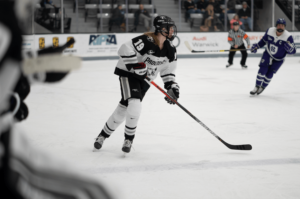
by Savannah Plaisted ’21
Opinion Co-Editor
Have you ever noticed the difference between going to a women’s hockey game and a men’s hockey game at Providence College? It is not the location of the game, or the skill level of the athletes. It is simply $4.
In order to gain entry to men’s hockey games on this campus, one must pay $4, while being charged nothing for women’s games. Some may say this is because of the level of attendance to the games, but is that not insulting to the women that practice just as hard as the men?
In a recent poll run by The Cowl, 63 percent of students agreed that it should cost the same to attend men’s and women’s sporting events, whether they be free or otherwise. If PC can afford to charge nothing at female games, it is clear that charging such a small rate for the men’s games is only the case in order to increase pre-existing profit margins. The College should either split the cost and charge $2 for entry to games of either gender, or make both free, in the name of gender equality.
This issue and others like it have been making national attention recently, especially in light of the recent 2019 World Cup win by the U.S. Women’s National Team. This win provided female athletes with a platform for voicing their concerns over the vast discrepancies in payment of male and female athletes. Female athletes for the USWNT were paid far less than their male counterparts, even while they won the World Cup and the men’s team failed to do so. Is that discrepancy not completely unjust?
According to the Washington Post, “Total prize money for the Women’s World Cup in 2019 is $30 million.” Meanwhile, “in the 2018 Men’s World Cup, the champions won $38 million from a total pool of about $400 million.” On top of this, outside of a World Cup atmosphere, in a 20 game scenario established for the purposes of the lawsuit by the USWNT, female athletes received about, “89 percent of the compensation of a similarly situated men’s team player.”
This is a clear indication of the sexism that is inherent in the world of athletics, given that these same women’s teams brought in equal if not more revenue in the year that this case was analyzed. One of the biggest arguments brought about in regards to the equal pay of athletes across gender lines is the idea that because the female organizations fail to achieve the same levels of revenue, they should by default be paid less. This clearly is not the case for the USWNT.
Meanwhile, here at PC, the women’s basketball team plays in Alumni Hall and does not receive anywhere close to the same amount of advertising as men’s basketball. One may argue that this is due to the fact that the female team does not bring in the same revenue, yet how should they be expected to when they receive varying degrees of advertising and play on-campus instead of in an outside arena that is arguably more open to the public?
Students are constantly peppered with emails regarding men’s basketball games—not only advertising the games in advance but also reporting the scores of the games immediately afterwards. Where are the women in this advertising? Both teams must be placed upon a level playing field in terms of the resources they are accorded in order to produce revenue, before it can be determined which team truly provides the most.
Women’s hockey at PC voiced the same concern, as Maureen Murphy ’21 said, “We wish they would advertise us more even though we aren’t a revenue-generating sport.” The fact of the matter is, each and every female sport at PC is capable of drawing in far more revenue, if they were only granted the same opportunities as the men’s sports on this campus.
With that being said, the College and the athletic department need to consider the social implications of putting male sports at an advantage on this campus, especially given the fact that this is an issue playing out on a global scale in today’s mass media.
Tangents & Tirades
by Andrea Traietti on February 27, 2020
Opinion
Mandatory out-of-Class Events
It is not unusual to find courses that incorporate immersive learning experiences corresponding to course material here at Providence College.
However, requiring students to attend these events outside of their regular course hours oversteps boundaries and creates unnecessary burdens for students, especially if the dates of these events are not announced until the first day of class.
The interim periods between semesters are times where families make plans and solidify dates when students may return home or be attending a family function, which means it is the professor’s responsibility to notify students of any external obligations as soon as they are determined.
The second issue with these requirements comes from the fact that students already dedicate at least two and a half hours per class each week, and piling additional hours of mandatory-attendance events detracts from a student’s quality of work for other courses.
Whether it is a film screening or attendance at a museum tour, professors should be taking into account how long these obligations are and reducing course sessions as appropriately to demonstrate a basic recognition that their course is not the only one students are taking.
There is nothing wrong with having students in a film class take time to go and attend a screening, or having students studying a certain style of painting to visit a museum. But visits and requirements can quickly accumulate, and if they are to be used effectively, they must accompany some form of a reduction in course meeting times for that week.
—Joshua Chlebowski ’21

Mid-Semester Course Evaluations
Students at Providence College are well-acquainted with the concept of exams at midterms, but perhaps PC should consider another kind of evaluation at the mid-point of the semester: teacher evaluations.
At the end of each semester, students are required to fill out an evaluation for each class they take, which requires them to provide feedback about teaching style, class content, use of technology in the classroom, and other individualized aspects of each course.
Last semester, PC made a change to the way course evaluations are collected, switching over from a Scantron-style form on paper to an online version. As the College continues to improve its collection of student feedback, it should consider encouraging professors to gather student perspectives at the middle of the semester, not just the end.
Student feedback is a critical component of making improvements to curricula and courses, and it is a positive thing that PC takes the collection of this information so seriously.
However, collecting feedback only at the end of each semester means that changes and improvements can only be made the next time that professor teaches that specific class. In some cases, that might not be for another six months or another year.
Furthermore, while it is helpful that feedback at the end of the semester might make the course a more enjoyable experience for future students, it does nothing to help the students who are actually in the class currently.
By asking for student feedback in the middle of the semester, either verbally or written out, professors can open a line of communication with their students, and in some cases, make much-needed changes to make the second half of the semester more effective and enjoyable for students and professors alike.
—Andrea Traietti ’21
No More PC Cash
Do you remember the days when you could purchase tickets for Providence College sponsored events without going through the hassle of adding PC Cash to your account? I sure do.
The College in recent years has switched to a system of only allowing students to pay for tickets using PC Cash, for reasons unbeknownst to the students.
The school provides kiosks in some locations for adding PC Cash, although these only take cash—which in and of itself is becoming an outdated concept. The school also offers the option of using a credit card online to add sums of money, but such a transaction includes a one dollar fine.
What is this dollar going towards? Is it really necessary considering the school allows students to use cash in other locations and does not charge them for doing so? Do students not give enough money to this institution as it is?
Not only is the act of having to put PC Cash on one’s account before purchasing a ticket inconvenient, but it is also altogether unnecessary given that students used to simply be able to go up to the ticket window and purchase whatever they pleased.
In sum, PC should return to the method of purchasing tickets only through the ticket window, with no caveats.
—Savannah Plaisted ’21

Writer vs. Writer: Too Soon to Discuss Kobe Bryant’s Sexual Assault Allegation?
by Andrea Traietti on February 6, 2020
Opinion

NO
by Savannah Plaisted ’21
Opinion Co-Editor
The recent death of Kobe Bryant is, of course, tragic and untimely. His face and highlights from his career were plastered across the internet for days afterwards, as people of all walks of life grieved him and the eight people that died along with him.
The problem inherent in this public grieving is the minimal acknowledgement of the darker side of his legacy.
The day after his untimely death, Kevin Draper of the New York Times wrote an exposé on Bryant’s 2003 rape allegation, as a reminder to the public of his actions.
Some might say this was too soon after his death to be dwelling on such a disturbing part of Bryant’s story, but the bottom line is the rape allegation is a part of his legacy. It is just as important as his outstanding athletic achievements.
In the days of the #MeToo movement, it is immensely important to ensure public knowledge of all accusations of sexual assault, regardless of how much they may damage a person’s reputation and no matter how glorified they are in the public arena.
Although the charges in his case were eventually dropped, Bryant later apologized to the woman that accused him and stated, “Although I truly believe this encounter between us was consensual, I recognize now that she did not and does not view this incident the same way I did.”
In no way is this a full confession to the rape allegation, but the very fact that consent was not entirely certain in this case is very problematic for Kobe Bryant’s reputation.
It is essential for the public to grieve the loss of a phenomenal athlete like Bryant, but it is equally essential that Draper published his article as quickly as he did.
If a man of Kobe Bryant’s reputation is going to be glorified in a very public way for days after his death, it is equally privy to acknowledge that he was also a man accused of rape.
YES
by Peter Mazzella ’21
Opinion Staff
The recent passing of NBA legend Kobe Bryant has left the whole world in shock, as social media was flooded with tributes celebrating his life. In the midst of these emotional responses, the New York Times took a different route.
One day after Bryant’s passing, New York Times reporter Kevin Draper published an article regarding a sexual assault allegation made against Bryant in 2003. The article stuck to the facts, but the question that is raised from the issue is when is it “too soon” to post it?
The urgency to make a headline took priority over the family’s mourning. No less than 24 hours after the tragic passing of Kobe Bryant, the article was published. While this may have driven massive amounts of traffic to the New York Times website and boosted readership in general, it is still extremely controversial.
A similar case involved a Washington Post reporter who received backlash after a tweet following initial allegations against Bryant. Following Bryant’s death, Felicia Somnez was suspended from the Post after tweeting, “Kobe Bryant’s Disturbing Rape Case: The DNA Evidence, the Accuser’s Story, and the Half Confession,” with a link to a Daily Beast article about the sexual assault case. The lack of judgement in both instances shows not only the ruthless nature of the news industry, but the willingness to go above and beyond to get published.
The most important thing in a tragedy like this is to give the family enough space to mourn privately.
While there is a fine line between doing one’s job and being considerate of the families involved, there is no reason that the Bryant family should have to hear this kind of news so soon. This style of reporting heavily favors profit over any regard for the family’s privacy. In this instance, it was not appropriate timing to publish given the worldwide impact that came along with it, and in future instances profit should not take priority over another human’s life.
Purchasing Professor Authored Books: A Conflict of Interest?
by Andrea Traietti on January 30, 2020
Opinion
by Savannah Plaisted ’21
Opinion Co-Editor

Have you ever taken a class with a professor that required you to purchase a book they authored? Has this seemed problematic to you?
As students that pay thousands upon thousands of dollars in tuition, that in turn pay for the salaries of these professors, does it seem morally unsound to put more money directly into professors’ pockets?
Now, these professors are of course experts in their fields and should be able to share their expertise and research within the classroom, especially when their research cannot be found elsewhere. However, they can pull excerpts from their research and use articles or chapters sparingly from their own work, rather than having students purchase their material.
If a professor decides to base an entire semester long course off of one of their books, it can be concerning, given that students will be receiving a very narrow knowledge of the course material.
Dr. Jennifer Illuzi, who is teaching a seminar on the Holocaust, spoke of using her own research in class in saying, “Many of the books are out of print or unavailable through our bookstore and thus, since I had just written a summary of the research myself, I thought it would be a good way to convey the material to my students, while also having them see an article in draft form, flaws and all.”
Although Dr. Illuzi is using her own research, she is doing so because there is not enough prior research on the subject, and she does not require her students to purchase this material, rather she posts it on Sakai.
With that being said, professors should take into account the moral implications of having students purchase their published work when designing their syllabi each semester.

